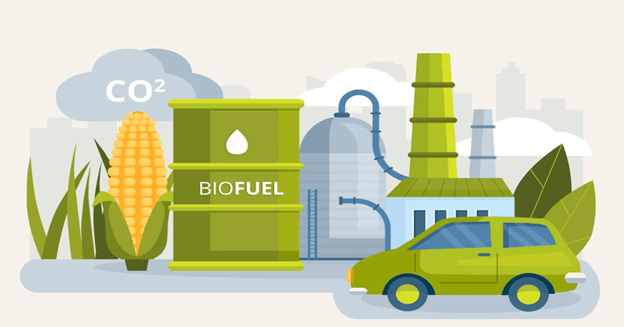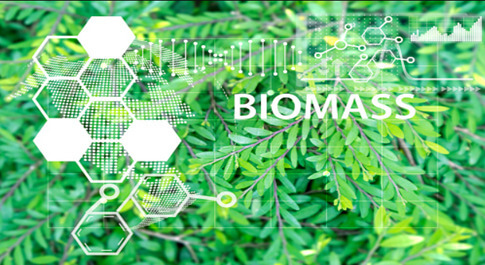Updated February 15, 2023
Biomass Energy
Organic matter such as crops, animals, and plants fuels biomass energy, which people consider a renewable energy source. Since combustion, gasification, and anaerobic digestion can generate electricity and produce fuels like ethanol and biodiesel, renewable energy sources like this do not require the burning of fossil fuels and naturally replenish themselves. The plants take in carbon dioxide while growing, and when burned, they release the same amount of carbon dioxide, making burning biomass carbon-neutral. Developed and developing countries increasingly use biomass energy, recognizing its importance as a renewable energy source.
Meaning of Biomass Energy
Biomass energy is energy derived from organic matter, such as plants, trees, and animals. Biomass energy powers both electricity and heat, making it a renewable energy source. The plants absorb carbon dioxide during photosynthesis, balancing the amount released during combustion, thus making biomass energy carbon-neutral.
(Image Credit:- Freepik)
Advantages and Disadvantages of Biomass Energy
The following are some of the advantages and disadvantages of Biomass Energy:-
Advantages
- Renewable: Biomass is a renewable energy source as it is continuously replenished and is available in copious amounts. The main biomass sources are organic materials such as wood, agricultural and forestry residues, animal waste, and biogas. All these sources are renewable, making biomass energy a sustainable energy source.
- Abundant: Biomass is one of the most abundant sources of energy available. Experts estimate that biomass stores over 450 quadrillion BTUs of energy, which is almost equivalent to the energy stored in all the fossil fuels combined.
- Low Emissions: The combustion of biomass results in lower emissions of carbon dioxide and other pollutants compared to traditional fossil fuels. Biomass energy is one of the cleanest energy sources, making it an attractive alternative for reducing carbon emissions.
- Low-Cost: Biomass energy is relatively inexpensive compared to other renewable energy sources. The cost of generating electricity from biomass is competitive with other sources such as wind, solar, and hydroelectricity.
- Versatile: Versatile energy source, biomass offers applications ranging from small-scale home heating to large-scale electricity generation. It can produce heat, electricity, and transportation fuels.
Disadvantages
- Inefficient: Converting biomass into a usable form of energy is an inefficient process. The conversion efficiency of biomass energy is much lower than other renewable energy sources, such as wind and solar.
- Expensive: Although biomass is a renewable and efficient energy source, the cost of producing it can be costly. The cost of harvesting, transporting, and storing biomass can add up. This makes biomass energy more expensive than other sources of energy.
- Pollution: Although biomass energy produces lower emissions than fossil fuels, it still produces some pollutants. The combustion of biomass can release pollutants such as carbon dioxide, nitrogen oxides, and particulate matter into the air.
- Land Use: Producing biomass energy requires large amounts of land. The production of biomass crops such as corn or soybeans can displace other land use activities such as food production or other conservation efforts.
- Limited Resources: The limitation of biomass energy is due to the limited availability of organic materials. Some areas may have a limited amount of biomass available.
Future of Biomass Energy
The future of biomass energy is bright. With suitable investments and policies, biomass energy can become a significant renewable energy source that can help reduce emissions, create jobs, and contribute to a sustainable future. People can use biomass energy in various ways, including electricity generation, heat, and transportation fuels. It is a flexible and cost-effective form of energy. Furthermore, advances in technology are opening up new opportunities for the use of biomass energy, such as biofuels and bioplastics. As the world transitions to a low-carbon economy, biomass energy will be an essential part of the energy mix.
(Image Credit:- Pixabay)
Conclusion
Biomass energy is an attractive option for meeting energy needs due to its renewability and availability. It is also relatively clean and can reduce dependence on fossil fuels. However, it is essential to consider the environmental impacts that biomass energy production can have – including land use, water resources, and air quality. Additionally, biomass energy production is still relatively expensive compared to other energy sources. With continued research, innovation, and development, however, biomass energy could become a more viable option for meeting energy needs in the future.
Recommended Articles
We hope that this EDUCBA information on “Advantages and Disadvantages of Biomass Energy” was beneficial to you. You can view EDUCBA’s recommended articles for more information,




